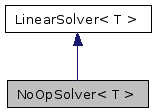NoOpSolver< T > Class Template Reference
#include <NoOpSolver.H>


template<class T>
class NoOpSolver< T >
Public Member Functions | |
| NoOpSolver () | |
| virtual | ~NoOpSolver () |
| virtual void | setHomogeneous (bool a_homogeneous) |
| virtual void | define (LinearOp< T > *a_factory, bool a_homogeneous) |
| virtual void | solve (T &a_phi, const T &a_rhs) |
| virtual void | setConvergenceMetrics (Real a_metric, Real a_tolerance) |
| Set a convergence metric, along with solver tolerance, if desired. | |
Constructor & Destructor Documentation
| NoOpSolver< T >::NoOpSolver | ( | ) | [inline] |
| virtual NoOpSolver< T >::~NoOpSolver | ( | ) | [inline, virtual] |
Member Function Documentation
| virtual void NoOpSolver< T >::setHomogeneous | ( | bool | a_homogeneous | ) | [inline, virtual] |
reset whether the solver is homogeneous.
Implements LinearSolver< T >.
| virtual void NoOpSolver< T >::define | ( | LinearOp< T > * | a_operator, | |
| bool | a_homogeneous | |||
| ) | [inline, virtual] |
Define the operator and whether it is a homogeneous solver or not. The LinearSolver does not take over ownership of this a_operator object. It does not call delete on it when the LinearSolver is deleted. It is meant to be like a late-binding reference. If you created a_operator with new, you should call delete on it after LinearSolver is deleted if you want to avoid memory leaks.
Implements LinearSolver< T >.
| void NoOpSolver< T >::solve | ( | T & | a_phi, | |
| const T & | a_rhs | |||
| ) | [inline, virtual] |
Solve L(phi) = rhs (phi = L^-1 (rhs)).
Implements LinearSolver< T >.
| virtual void NoOpSolver< T >::setConvergenceMetrics | ( | Real | a_metric, | |
| Real | a_tolerance | |||
| ) | [inline, virtual] |
Set a convergence metric, along with solver tolerance, if desired.
Default implementation does nothing, since there are probably cases (liked direct solves), where this has no real meaning.
Reimplemented from LinearSolver< T >.
The documentation for this class was generated from the following file:
 1.5.5
1.5.5